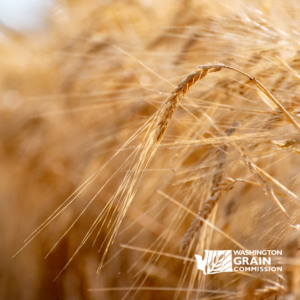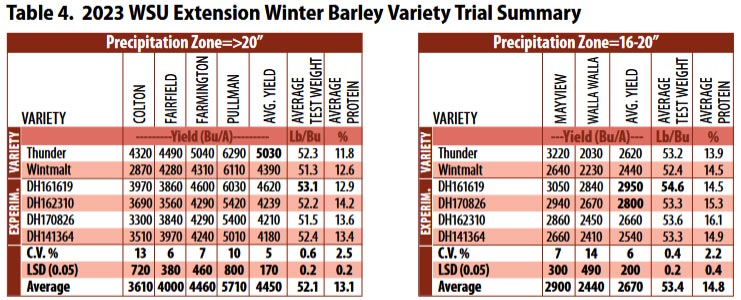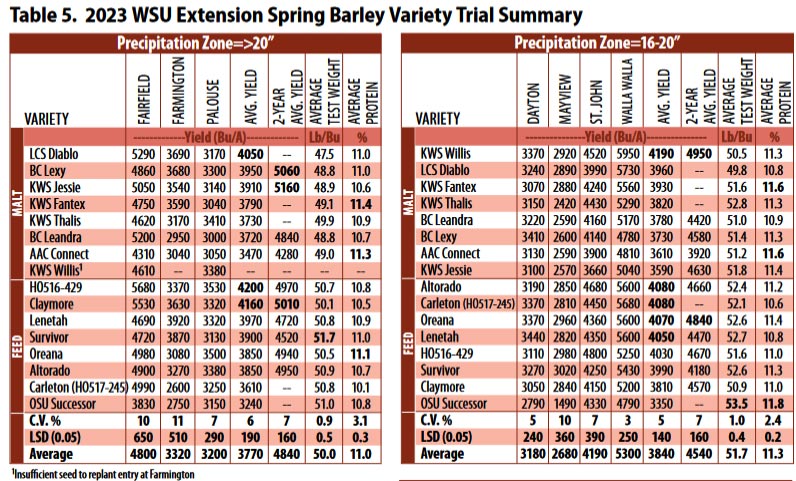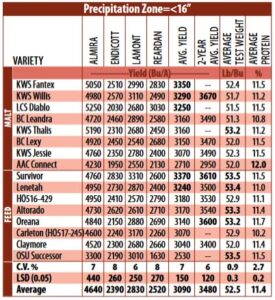By Clark Neely
 Spring barley saw a nice bump in acres throughout the Inland Pacific Northwest in 2023 thanks, in part, to some better prices. Unfortunately, yields did not follow the same trend due to dry conditions for much of the region throughout the spring. In the spring barley variety trials, the number of entries in 2023 remained the same at 24 total with eight malt varieties and seven feed barley varieties. There were also seven experimental malt and two experimental feed barley lines tested at each site.
Spring barley saw a nice bump in acres throughout the Inland Pacific Northwest in 2023 thanks, in part, to some better prices. Unfortunately, yields did not follow the same trend due to dry conditions for much of the region throughout the spring. In the spring barley variety trials, the number of entries in 2023 remained the same at 24 total with eight malt varieties and seven feed barley varieties. There were also seven experimental malt and two experimental feed barley lines tested at each site.
Starting with the malt varieties, LCS Diablo, KWS Fantex, and KWS Thalis were all relatively new in 2023; however, all three had previously been tested in 2020 and/or 2021, so there is a gap in their long term averages. In general, LCS Diablo, KWS Willis, and KWS Fantex all had a good showing in 2023, particularly in locations below 20 inches of annual precipitation. Growers should pay attention to test weight with LCS Diablo, though. While it generally landed above 48 pounds per bushel, it doesn’t always make that threshold, and it often comes in last in the trial for test weight. BC Lexy and KWS Jessie continued to do well in the over-20-inch zone, however, their performance really dropped off in the lower precipitation zones. Both BC Leandra and KWS Thalis landed solidly in the middle of the pack in each zone falling within 60 pounds per acre of each other.
For the feed barleys, there were several newer entries entered this year. HO516-429 is a second-year entry from Highland Specialty Grains that took the number one spot in 2023 in the high rainfall zone overall. It also beat the trial average in the other precipitation zones as well. It received a resistant rating for barley stripe rust and shows good straw strength. Carleton (HO517-245) tied Altorado for the number one feed barley in the 16-to-20-inch zone, though it fell below the trial averages in the other precipitation zones. It has strong stripe rust resistance and typically comes in with the lowest protein in the trial. The other newcomer to the trial was the OSU entry, OSU Successor. This release is another IMI-tolerant variety intended to replace Survivor; however, yields were consistently 600 to 800 pounds per acre less than Survivor, and it was dead last in the trial in most cases. It typically had one of the best test weights in the trial, and heading dates were typically five to seven days earlier for OSU Successor compared to Survivor.
New in 2023 are variety trials comparing winter barley varieties and breeding lines. This is to address an expanding focus by the Washington State University (WSU) barley breeding program to develop better adapted winter barleys for Eastern Washington. The trials occurred beside all winter wheat variety trials at locations over 16 inches of average annual precipitation. These trials only had two commercial checks, Wintmalt and Thunder, and four experimental lines submitted by WSU in 2023. The number of entries did increase to eight
for the 2024 season, which included the addition of LCS Saturn and BC Clementine.
In general, Thunder was numerically higher yielding than Wintmalt at all but one of the published trial sites. Data was not published from Dayton or St. John as varieties were not significantly different from one another in those trials. Winter injury was observed at both St. John and Walla Walla sites in 2023 where Thunder appeared to be the most sensitive, while all four experimental lines appeared more tolerant of the cold temperatures compared to either commercial variety. Another interesting observation was that the winter barley entries were roughly two weeks ahead of winter wheat varieties in heading.

 While a summary of 2023 and two-year yield data are presented in this article, growers are always encouraged to spend more time looking at multiyear data for a better representation of variety performance when available. Additional information, ratings, and yield data can be found on our website. If you have any questions or concerns, please feel free to contact me at [email protected].
While a summary of 2023 and two-year yield data are presented in this article, growers are always encouraged to spend more time looking at multiyear data for a better representation of variety performance when available. Additional information, ratings, and yield data can be found on our website. If you have any questions or concerns, please feel free to contact me at [email protected].
Acknowledgements: Funding for supplies, travel, and technical support for the WSU Extension Cereal Variety Testing Program is provided by the Washington Grain Commission. Facilities, salary, and equipment are provided by WSU administration. We are grateful for the many on-farm cooperators we partner with to conduct these trials around the state. They are essential for producing quality data and their donations of land, time, and resources are appreciated.
This article originally appeared in the January 2024 issue of Wheat Life Magazine.

Clark Neely, Ph.D.
Clark Neely is the cereal variety testing lead and extension agronomist at Washington State University. His research interests include dryland cropping systems and advancing cereal variety testing. Read more about Dr. Neely.
